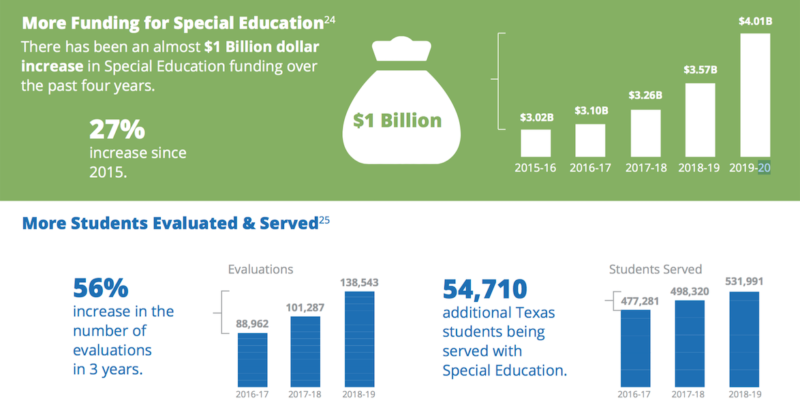Texas schools are evaluating more children for Special Education needs and placing more than ever before in Special Education, according to an annual report published this week by the Texas Education Agency.
The report calls Special Education an area of “major improvement” in Texas public schools over the past couple of years.
Last year Texas public schools served 531,991 with Special Education, an increase of 33,671 over the prior year. Statewide, funding for Special Education grew by nearly a half billion dollars last year.
Since 2015 the Texas Education Agency nearly quadrupled the number of employees it dedicates to special education, from 20 to 79.
These staff are monitoring or supporting an increasing number of school districts or charters, 277 this year compared to 108 five years ago. This type of intervention takes place when a local school district is underperforming and is put under closer state oversight.
TEA Commissioner Mike Morath wrote in a forward to the report, “In 2018, the Texas Education Agency launched a comprehensive plan for special education. While much work remains, Texas has made important strides in recent years to improve the support for our students receiving special education services.”
Overall about 9.8% of Texas students are enrolled in Special Education. Another 19.4% are enrolled in bilingual or ESL programs.
The report notes, “Increasingly, students in Texas public schools are coming in from low-income households. Over the past 20 years, the percentage of students who are economically disadvantaged, as measured by being eligible for a free or reduced-price lunch, has risen more than 12 percentage points.”
Owing to a $3.4 billion annual funding hike by the Legislature last year, public schools are now getting on average $635 more per student.
TEA highlighted one major negative trend in its report: “Results from the National Assessment of Educational Progress (NAEP) show that Texas students have seen a decline in recent years in middle school reading and math proficiency.”
Overall, Texas ranks 46th out of the 50 states in 8th grade reading and 32nd in 8th grade math. “It will take intentional planning and focused execution to tackle these challenges,” said Morath.
Image Credit: TEA
